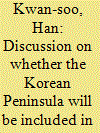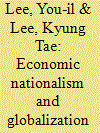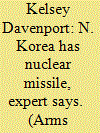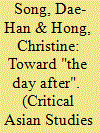|
|
|
Sort Order |
|
|
|
Items / Page
|
|
|
|
|
|
|
| Srl | Item |
| 1 |
ID:
137228


|
|
|
|
|
| Summary/Abstract |
This study aims to discuss whether the Korean Peninsula is included among the core interests claimed by China. The core interests of China are those interests that it is unwilling to negotiate over, and interests that they will even use military power to protect. China’s official core interests have so far been limited to Taiwan, Tibet and Xinjiang, but their list of core interests has been expanding in scope
since the Diaoyu/Senkaku Islands dispute. Furthermore, including the Korean Peninsula among China’s core interests leads to an immense ripple-effect on not only South Korea but also the security of Northeast Asia and U.S.-China relations. This study analyzes the following research questions: What are the core interests of China? Is the Korean Peninsula included in China’s core interests? Will the Korean Peninsula only be included in China’s core interests in the event of an emergency? If it is included, what is the specific object or likely scenario? This study conducts an in-depth analysis of the questions above and provides policy implications for the South Korean government.
|
|
|
|
|
|
|
|
|
|
|
|
|
|
|
|
| 2 |
ID:
137188


|
|
|
|
|
| Summary/Abstract |
In this article we explore whether South Korea's long-standing tradition of economic nationalism remains an appropriate development strategy, or whether this approach has been rendered irrelevant by the current wave of neoliberal globalization led by multinational corporations. We examine the changed economic agendas of each Korean regime, with a particular focus on national identity and economic nationalism, mobilized and implemented by the state. We argue that, despite the rapid development of globalization and cosmopolitanism in South Korea, economic nationalism is still prevalent. Korea's adoption of neoliberal economic activities, such as lifting trade barriers to encourage the inflow of foreign direct investment, was necessary to assist certain areas of the economy. Furthermore, changing the direction of the growth trajectory remains subordinate to the goal of state building. Empirical analysis of results collected from survey data and one-on-one interviews conducted in 2010 help to validate our hypothesis.
|
|
|
|
|
|
|
|
|
|
|
|
|
|
|
|
| 3 |
ID:
131615


|
|
|
|
|
| Publication |
2014.
|
| Summary/Abstract |
North Korea probably can make nuclear warheads that are small enough to fit on its ballistic missiles, and activities at its nuclear test site and satellite launch facility likely indicate that Pyongyang is planning further tests to continue improving its nuclear arsenal, a former South Korean official said last month.
In a May 19 interview, the former official said that Pyongyang can "likely fit a nuclear warhead on a Rodong missile" although it is not certain that the warhead would detonate properly.
The medium-range Rodong missile, also known as the Nodong, is a deployed system with a range of 1,300 kilometers. This places South Korea, Japan, and parts of China within its range.
Experts have expressed skepticism in the past about North Korea's ability to deliver a nuclear warhead via a missile, but that sentiment apparently is beginning to shift.
|
|
|
|
|
|
|
|
|
|
|
|
|
|
|
|
| 4 |
ID:
127763


|
|
|
|
|
| Publication |
2014.
|
| Summary/Abstract |
Since 1998, the National Endowment for Democracy (NED), a quasi-private, grant-making organization funded almost entirely by the U.S. Congress via the U.S. State Department, has been, directly or indirectly through its four core institutes, supporting right-wing, neoconservative South Korean human rights and defector groups. In addition to technical assistance, this support has included $6.7 to $11.9 million from 1999 to 2010, with an additional $3 million starting January 2009 directly disbursed to many of these groups by the State Department under then newly elected Barack Obama. This article contends that NED's "human rights" work is part of a much larger strategy of destabilizing the North Korean government in line with U.S. interventionist aims against its foes. By funding international conferences and defector critiques of North Korea (including strategic testimony provided before Congress in the push for passage of the North Korean Human Rights Act of 2004), NED has fostered a North Korean human rights knowledge economy that has substantially shaped public images and opinion about North Korea in South Korea, the United States, and around the world. At the same time, NED's radio broadcasting, propaganda leaflet drops, and other incursionary media have sought to sow discord in North Korea.
|
|
|
|
|
|
|
|
|
|
|
|
|
|
|
|
|
|
|
|
|